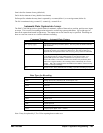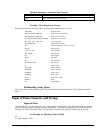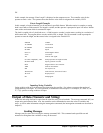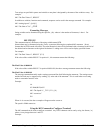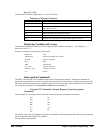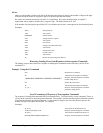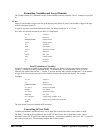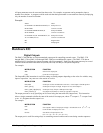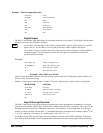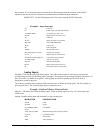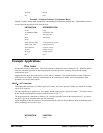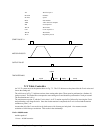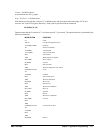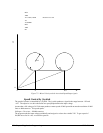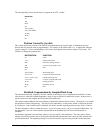
DMC-1700/1800 Chapter 7 Application Programming • 167
Example - Turn on output after move
#OUTPUT Label
PR 2000 Position Command
BG Begin
AM After move
SB1 Set Output 1
WT 1000 Wait 1000 msec
CB1 Clear Output 1
EN End
Digital Inputs
The DMC-1700/1800 has eight digital inputs for controlling motion by local switches. The @IN[n] function returns
the logic level of the specified input 1 through 8.
1X80
For the DMC-1750 thru DMC-1780 or DMC-1850 thru DMC-1880, the @IN[n] function is valid for
inputs 1 thru 24. For the DMC-17X8, the @IN[n] function is valid for inputs 1 through 80.
For example, a Jump on Condition instruction can be used to execute a sequence if a high condition is
noted on an input 3. To halt program execution, the After Input (AI) instruction waits until the
specified input has occurred.
Example:
JP #A,@IN[1]=0 Jump to A if input 1 is low
JP #B,@IN[2]=1 Jump to B if input 2 is high
AI 7 Wait until input 7 is high
AI -6 Wait until input 6 is low
Example - Start Motion on Switch
Motor X must turn at 4000 counts/sec when the user flips a panel switch to on. When panel switch is turned to off
position, motor X must stop turning.
Solution: Connect panel switch to input 1 of DMC-1700/1800. High on input 1 means switch is in on position.
INSTRUCTION FUNCTION
#S;JG 4000 Set speed
AI 1;BGX Begin after input 1 goes high
AI -1;STX Stop after input 1 goes low
AMX;JP #S After motion, repeat
EN;
Input Interrupt Function
The DMC-1700/1800 provides an input interrupt function which causes the program to automatically execute the
instructions following the #ININT label. This function is enabled using the II m,n,o command. The m specifies the
beginning input and n specifies the final input in the range. The parameter o is an interrupt mask. If m and n are
unused, o contains a number with the mask. A 1 designates that input to be enabled for an interrupt, where 2
0
is bit
1, 2
1
is bit 2 and so on. For example, II,,5 enables inputs 1 and 3 (2
0
+ 2
2
= 5).
A low input on any of the specified inputs will cause automatic execution of the #ININT subroutine. The Return
from Interrupt (RI) command is used to return from this subroutine to the place in the program where the interrupt



